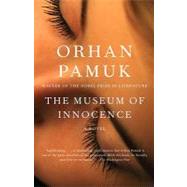It is 1975, a perfect spring in Istanbul. Kemal and Sibel, children of two prominent families, are about to become engaged. But when Kemal encounters Füsun, a beautiful shopgirl and a distant relation, he becomes enthralled. And once they violate the code of virginity, a rift begins to open between Kemal and the world of the Westernized Istanbul bourgeoisie. In his pursuit of Füsun over the next eight years, Kemal becomes a compulsive collector of objects that chronicle his lovelorn progress—amassing a museum that is both a map of a society and of his heart. Orhan Pamuk’s first novel since winning the Nobel Prize is a stirring exploration of the nature of romance.
“Spellbinding. . . . A resounding confirmation that Orhan Pamuk is one of the great novelists of his generation. With this book, he literally puts love in our hands.”-The Washington Post
“Mesmerizing, brilliantly realized. . . . Deeply and compellingly explores the interplay between erotic obsession and sentimentality . . . . There is a master at work in this book. . . . Istanbul—its sounds, its smells, its history—permeates everything.”-Los Angeles Times
“Intimate and nuanced…. A classic, spacious love story.”-Pico Iyer, The New York Review of Books
“Stunningly original. . . . Engrossing and sensual. . . . Granular and panoramic, satirical and yet grounded in reality. . . . Great writers have made the failed love stories of desperate, self-involved men pulsate. A master, like Pamuk, makes the story feel vital.”-The Associated Press
“Pamuk has created a work concerning romantic love worthy to stand in the company of Lolita, Madame Bovary, and Anna Karenina. . . . Pamuk is as accomplished an anatomist of love as Stendhal or Hazlitt in Liber Amoris. . . . Kemal’s narrative crosses decades, assembling a fascinating social world of families, friends and dependents, a rich palimpsest of the lives and mores of Istanbul’s haute bourgeoisie.”-Financial Times








